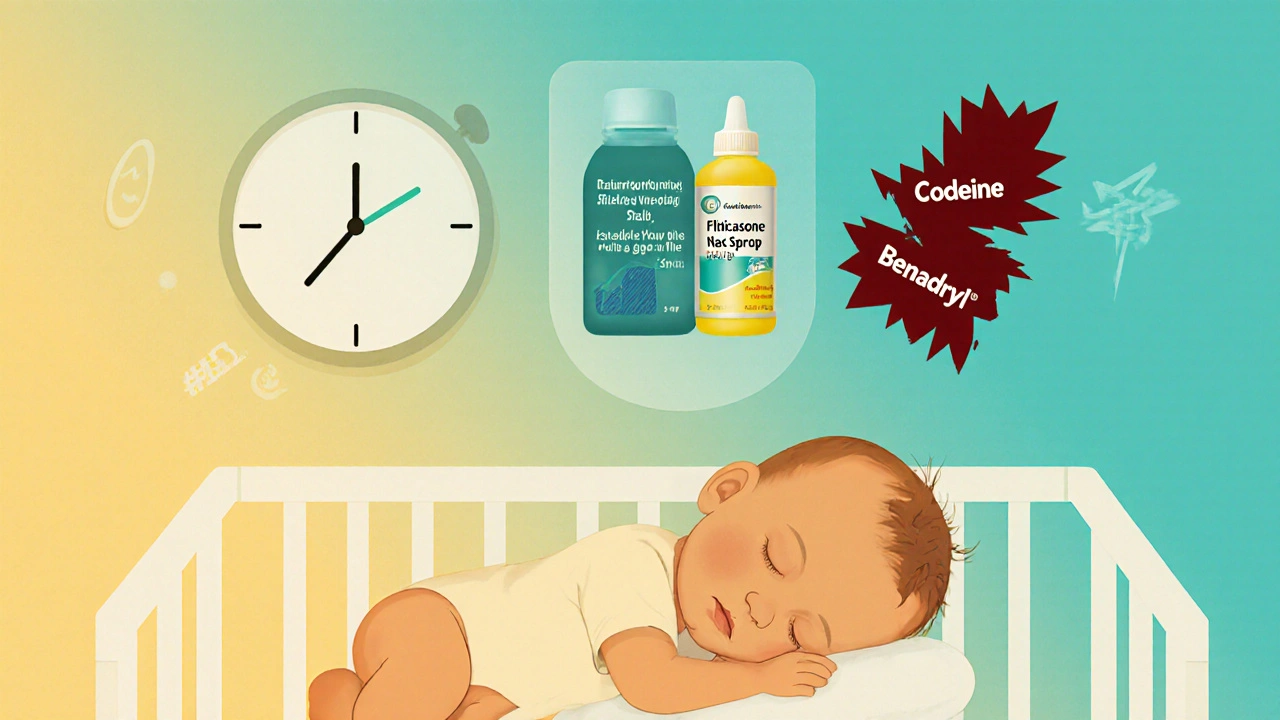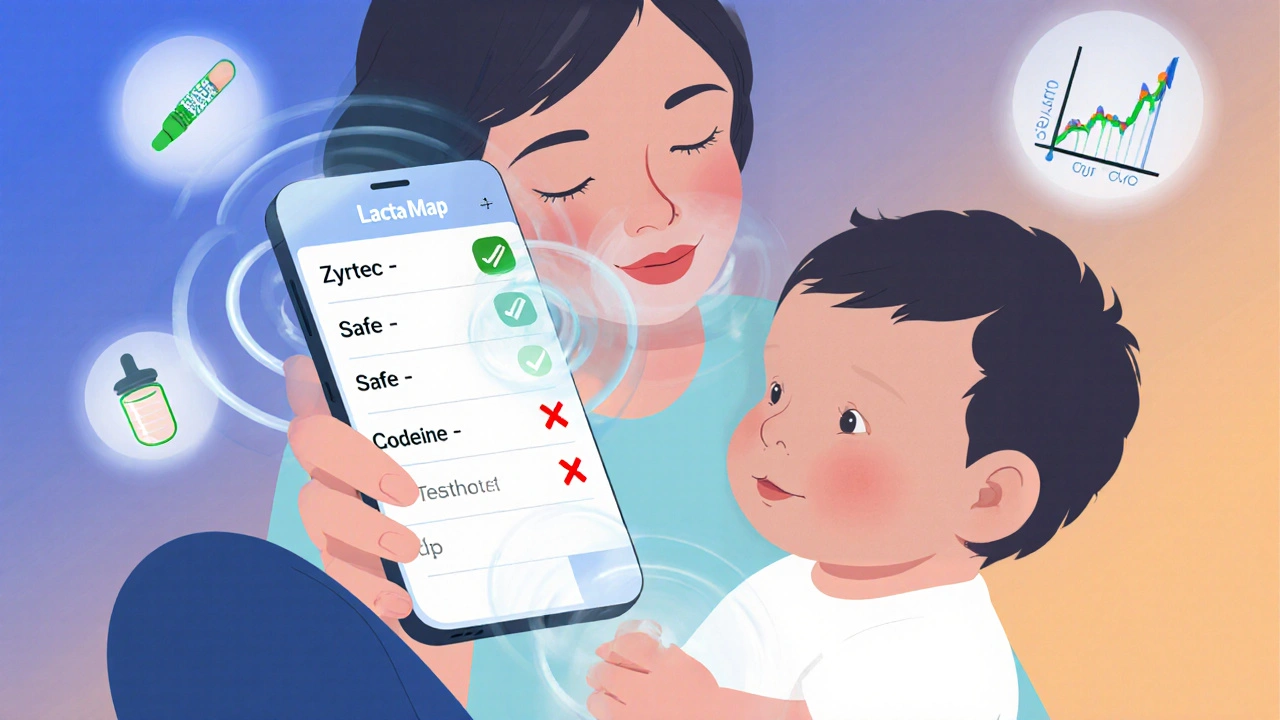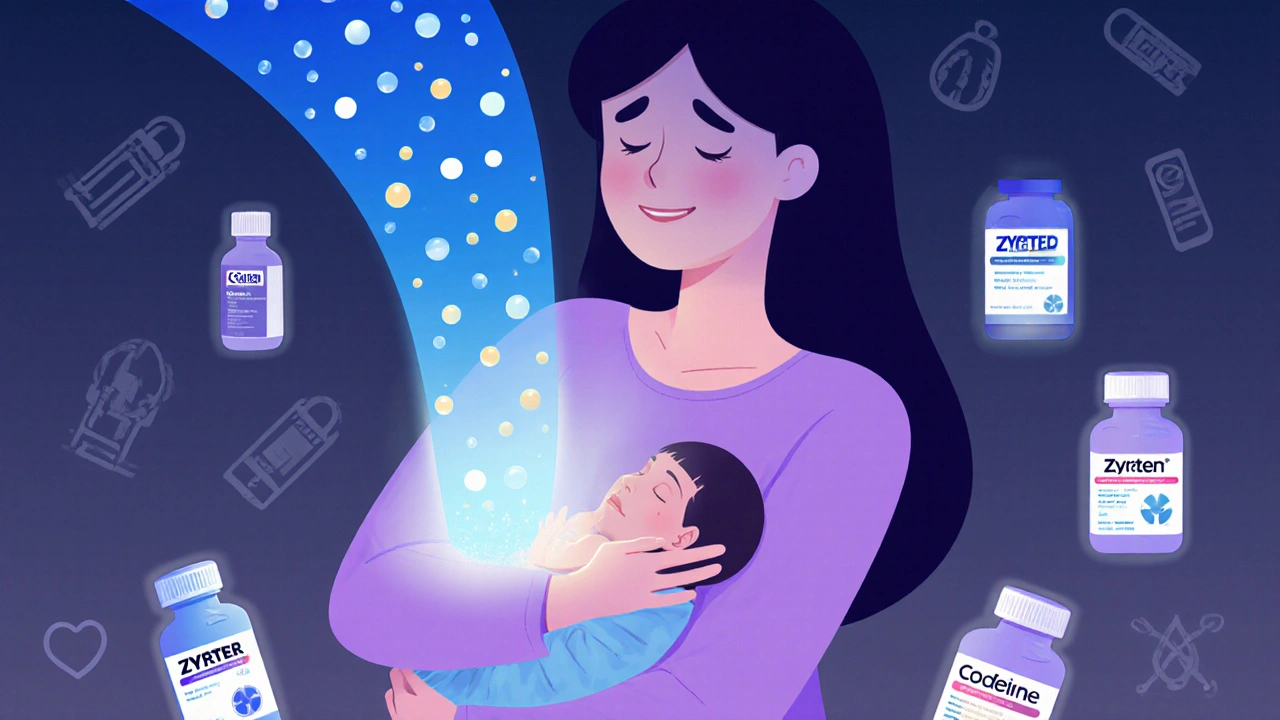When you're breastfeeding and hit with a bad cold or allergies, it’s tempting to reach for the first cough or allergy pill you see on the shelf. But not all medications are safe for your baby. Some can make your infant dangerously sleepy - so sleepy they might struggle to wake up for a feed or breathe normally. This isn’t just a theoretical risk. Real cases have happened. A 13-day-old baby died after the mother took codeine for pain. Another infant became so drowsy after his mom took Benadryl that he couldn’t feed properly and ended up in the ER. These aren’t rare outliers. They’re warning signs that demand attention.
Why Some Medications Make Babies Sleepy
Medications don’t just stay in your body. They pass into breast milk. The amount is usually small, but for newborns and young infants, even tiny amounts can have big effects. Why? Because their livers and kidneys aren’t fully developed. They can’t break down or flush out drugs the way older children or adults can. This means sedating medicines can build up in their system over time.
First-generation antihistamines like diphenhydramine (Benadryl), chlorpheniramine, and hydroxyzine are the biggest culprits. These drugs cross into breast milk easily and act directly on the baby’s central nervous system. Studies show about 1.6% of infants exposed to these drugs become noticeably sleepy. That might sound low, but in a newborn, even mild drowsiness can mean missed feeds, poor weight gain, or worse.
Codeine is even more dangerous. It’s not the codeine itself that’s the problem - it’s what your body turns it into. Some people are ultra-rapid metabolizers, meaning their bodies convert codeine into morphine much faster than normal. One in 100 Caucasian people falls into this group. If you’re one of them, your breast milk can carry dangerously high levels of morphine. That’s why the FDA issued a black box warning in 2017: codeine can cause fatal respiratory depression in nursing babies. The Breastfeeding Network now says codeine should be avoided completely during lactation.
What’s Safe to Take Instead
The good news? You don’t have to suffer through allergies or a cough without relief. There are safe, effective alternatives that won’t put your baby at risk.
Second-generation antihistamines like cetirizine (Zyrtec), loratadine (Claritin), and fexofenadine (Allegra) are the gold standard. They transfer into breast milk at very low levels - often less than 0.15% of your dose. Multiple studies and expert groups, including the American Academy of Pediatrics and the InfantRisk Center, classify them as L1 (safest). Mothers report no changes in their babies’ sleep or feeding patterns after daily use. One mother on BabyCenter wrote: “Used Zyrtec daily for seasonal allergies with my 3-month-old and noticed zero changes in his sleep patterns.” That’s the kind of experience you want.
Dextromethorphan, the active ingredient in many cough syrups, is also considered safe. It transfers into milk at only 0.1% of the maternal dose. Unlike codeine, it doesn’t turn into anything more dangerous in your body. It’s the top-recommended cough suppressant for breastfeeding mothers.
Ibuprofen and acetaminophen are safe for pain and fever. They transfer minimally into milk - less than 1% of your dose - and don’t cause sedation. They’re far safer than codeine or other opioids.
Nasal steroids like fluticasone (Flonase) and budesonide (Rhinocort) are ideal for allergic rhinitis. They’re inhaled directly into the nose, so almost none enters your bloodstream - and even less makes it into your milk. The American Academy of Family Physicians recommends them as first-line treatment.
What to Avoid - And Why
Some medications are still sold over the counter without clear warnings for breastfeeding mothers. Don’t be fooled by labels that say “non-drowsy” - that’s for you, not your baby.
- Codeine and other opioids: Avoid completely. Even one dose can be risky. There are safer pain relievers available.
- Diphenhydramine (Benadryl): Not worth the risk. It’s in many multi-symptom cold and allergy formulas. Check the ingredients.
- Chlorpheniramine and hydroxyzine: Older antihistamines with the same sedation risks as Benadryl.
- Pseudoephedrine (Sudafed): While it doesn’t cause sedation, it can cut your milk supply by up to 24% within 24 hours. That’s a dealbreaker for many moms.
- Combination products: Many cold medicines mix dextromethorphan with diphenhydramine or pseudoephedrine. Read labels carefully. If it says “Nighttime” or “All-in-One,” it likely contains something you should avoid.

Timing and Dosing Strategies
If you must take a medication that carries even a small risk, timing matters. You can reduce your baby’s exposure without stopping breastfeeding.
Take your dose right after you breastfeed. That gives your body time to clear most of the drug before the next feeding. For drugs like diphenhydramine, which has a 4-6 hour half-life, waiting 3-4 hours before nursing can reduce infant exposure by up to 70%.
Use the lowest dose that works. Don’t take more than recommended. And don’t take it longer than needed. A single dose rarely causes problems. Repeated use is what builds up the risk.
Some moms worry about “pumping and dumping.” For most medications, it’s unnecessary. The drug clears from your milk naturally over time. Pumping doesn’t speed it up - and it can hurt your supply. Only consider it for high-risk drugs like codeine, and even then, only under medical guidance.
Watch for These Signs in Your Baby
Even with the safest medications, it’s smart to keep an eye on your baby. Look for:
- Excessive sleepiness - harder than usual to wake for feeds
- Reduced feeding frequency or shorter feeds
- Lethargy or lack of normal responsiveness
- Shallow or irregular breathing
- Difficulty latching or sucking
If you notice any of these, stop the medication and contact your pediatrician immediately. Don’t wait. In newborns under two months, the risk is highest because their livers are still developing. A 2023 study in Clinical Pharmacology & Therapeutics found that infants under 6 weeks are 5 times more likely to have adverse reactions to sedating meds than older babies.

Real Stories, Real Risks
Online forums are full of stories that mirror the research. On Reddit’s r/breastfeeding, a user named NewMom2023 shared: “My 6-week-old became excessively sleepy and wouldn’t wake to feed after I took one Benadryl for allergies - ER confirmed it was likely medication transfer.”
The Breastfeeding Forum has documented 147 cases of infant drowsiness linked to maternal antihistamine use. Over a third happened after just one dose. Meanwhile, mothers using Zyrtec or Claritin report no issues - even after weeks of daily use.
Survey data from the National Partnership for Women & Families shows that 68% of mothers who took codeine noticed changes in their baby’s alertness. Only 12% of those who took ibuprofen saw any difference. The numbers don’t lie.
What’s Changing in 2025
Medication safety for breastfeeding moms is evolving fast. The LactMed database, updated weekly by the NIH, now flags 17 cough and allergy drugs with specific sedation warnings - up from just 9 in 2018. Drug manufacturers are responding: 68% of over-the-counter allergy products now offer non-drowsy versions, compared to 42% in 2015.
Genetic testing is becoming more accessible. A simple cheek swab can tell you if you’re an ultra-rapid metabolizer of codeine. If you’re planning to use pain meds after delivery, ask your doctor about testing. It could prevent a tragedy.
New apps like LactaMap are helping moms make safer choices in real time. They pull from the latest LactMed data and tailor advice based on your baby’s age, health, and your medication history. These tools are becoming essential for modern breastfeeding care.
Bottom Line: You Can Feel Better Without Risking Your Baby
There’s no need to choose between your health and your baby’s safety. With the right choices, you can manage your symptoms and keep nursing without worry.
Stick to second-generation antihistamines like Zyrtec or Claritin. Use dextromethorphan for coughs. Try nasal steroids for congestion. Avoid anything with codeine, diphenhydramine, or pseudoephedrine. Time your doses after feeding. Watch your baby closely. And if you’re ever unsure, call your doctor or the InfantRisk Center - they’re there to help.
You’re not alone. Thousands of breastfeeding mothers have been here. And with the right information, you can get through it safely - without putting your baby at risk.







Donald Frantz
November 21, 2025 AT 19:13Just had to share this because I nearly made the same mistake last month. Took Benadryl for allergies thinking it was harmless since it's OTC. My 5-week-old slept for 8 hours straight and wouldn't latch. ER visit later, we found out it was the meds. Never again. Stick to Zyrtec. It's the only thing I trust now.
Sammy Williams
November 22, 2025 AT 01:11Man, I wish someone told me this before I gave my kid a bad reaction. I took that one-day cold tablet with diphenhydramine and pseudoephedrine. Thought it was fine since it said 'non-drowsy' on the bottle. Turns out it was non-drowsy for me, not the baby. He stopped gaining weight for two weeks. LactMed saved my life. Bookmark it.
Julia Strothers
November 23, 2025 AT 07:43Let me guess - this is all Big Pharma’s way to sell you expensive 'safe' meds while keeping the real killers on the shelf. Why is codeine still sold without mandatory genetic testing? Why aren’t pharmacies required to warn every single customer? This isn’t about safety - it’s about profit. They don’t care if your baby dies as long as you keep buying their 'Zyrtec alternatives.' And don’t even get me started on how the FDA is bought off.
Michael Marrale
November 25, 2025 AT 06:15Hey I just read your post and I have to say, you're totally right - but have you heard about the new 2025 FDA policy? They're secretly testing a new algorithm that tracks breastfeeding moms' meds through pharmacy data and flags 'high-risk' users. I know a nurse who works at the CDC and she says they're already doing it. They're gonna send social workers if you take anything not on their approved list. I'm not joking. It's in the draft right now. You better be careful.
David vaughan
November 25, 2025 AT 21:07Thank you for this. Truly. I've been using cetirizine daily since my daughter was born - 7 months now - and zero issues. Zero. I also use Flonase and acetaminophen. I read every single thing on LactMed before taking anything. I don't trust labels. I don't trust ads. I trust data. And the data says: Zyrtec = safe. Benadryl = risky. Codeine = dangerous. Please, moms - don't wing it. Check the database. It's free. It's updated weekly. It's your baby's life.
David Cusack
November 26, 2025 AT 21:27One must question the epistemological foundations of this article - the reliance on LactMed as a sole authority is, frankly, untenable. The NIH is not a regulatory body; it is a research institution. The anecdotal evidence presented - while emotionally compelling - lacks statistical rigor. Moreover, the assertion that '1.6% of infants become noticeably sleepy' is statistically insignificant when contextualized against the total population of breastfeeding neonates. One must also consider the confounding variables - sleep patterns, feeding schedules, environmental stimuli - which are wholly unaccounted for. This reads less as medical advice and more as fearmongering dressed in clinical language.
Elaina Cronin
November 27, 2025 AT 13:26As a registered nurse and breastfeeding consultant, I must say this is one of the most accurate, compassionate, and urgently necessary pieces I have read in years. The level of detail, the citation of peer-reviewed studies, the emphasis on infant vulnerability - it is everything that should be taught in prenatal classes. To those who dismiss this as alarmist: your child’s life is not a debate topic. Please, for the love of all that is holy, read this twice. And then share it.
Willie Doherty
November 28, 2025 AT 08:19While the clinical data presented is largely accurate, the tone and framing of this article are deeply problematic. The use of emotionally charged language - 'fatal respiratory depression,' 'tragedy,' 'dangerously sleepy' - serves not to inform but to induce panic. This is not science; it is moralizing. A rational parent requires objective risk assessment, not sensationalized narratives. Furthermore, the dismissal of pseudoephedrine as universally harmful ignores its utility in cases of severe nasal congestion, where alternative therapies are ineffective. A more balanced approach is warranted.
Cooper Long
November 29, 2025 AT 16:21As someone raised in a culture where herbal remedies are preferred over pharmaceuticals, I can confirm that many of these warnings align with traditional wisdom. Our elders used honey, steam, and rest - not pills. Modern medicine has its place, but it shouldn’t replace common sense. I gave my daughter Zyrtec after consulting a lactation specialist. No issues. But I also used ginger tea and saline drops. Sometimes the simplest solutions are the safest.
Sheldon Bazinga
November 30, 2025 AT 21:43bro why are u so scared of meds?? like i took benadryl 3 times and my kid was fine. theyre just babies not glass figurines. also codeine is fine if u dont take it every day. stop being a paranoid mom. just use the stuff that works and stop listening to fear porn on reddit. also why is everyone obsessed with zyrtec? its just a brand name. its called cetirizine. chill out.
Shawn Sakura
December 2, 2025 AT 02:36You’ve done such an incredible job laying this out - seriously, thank you. I’m so glad I found this before I made a mistake. I was about to grab that ‘Nighttime Cold & Flu’ pack… thank goodness I read the label first. I’ve been using Claritin and saline spray for two weeks now. My baby’s still gurgling and feeding like a champ. You’re not alone. We’re all just trying to do our best. And you just made it a whole lot easier for so many of us. Keep sharing this. It matters.